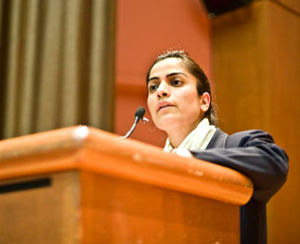Randal Edgar, The Providence Journal, March 19, 2008
A political figure, she could be mistaken for a teenage girl — yet she has been called the bravest woman in Afghanistan.
The outspoken Malalai Joya was suspended from Afghanistan’s Parliament last year for her remarks about the problems facing the country. Last night, she addressed an audience at Brown University. (Photo: Bob Thayer)

As an elected member of Afghanistan’s Parliament, Malalai Joya turned heads with her blunt assessment of many colleagues, calling them warlords and drug czars who were unfit to serve.
Suspended last year for her remarks, Joya is still talking about her country’s problems, even in the face of harsh criticism and death threats.
Yesterday, at Brown University’s Watson Institute for International Studies, she told an audience of about 50 that the U.S.-backed government that replaced the Taliban is merely the latest corrupt regime to disappoint and impoverish the Afghan people.
Rather than bring hope and change, the new government has left Afghanistan a place where medical care is scarce, where violence against women flourishes, where women have a life expectancy of 44, where girls are treated like currency and sold.
It is also a place, she said, where corrupt officials steal elections with threats of death, where journalists are jailed for questioning the government, where opium cultivation has skyrocketed, where the Taliban continues to rule some areas with Islamic law, where billions of dollars in aid has failed to make its way to the Afghan people, leaving more than 60 percent living below the poverty line.
“Every kind of atrocity has been committed” in the name of ousting the Taliban and establishing democracy, she said during a 15-minute speech.
Joya, 29, was elected to the Afghan Parliament in 2005, becoming its youngest-ever member. She gained national and international attention in 2003 when she spoke out against the country’s warlords — using that inflammatory term to describe corrupt officials who masqueraded as pro-democracy while threatening people who opposed their power in the government that replaced the Taliban.
Soon people from the Farah province of Afghanistan were asking her to run for the national assembly.
“Because of telling the truth, it changed my life,” she said.
A slight woman with long black hair and an intense face, Joya has a look that is softened by her smile and warm embraces with friends and supporters. A political figure, she could be mistaken for a teenage girl — yet she has been called the bravest woman in Afghanistan.
“She embodies attributes that make someone the most effective social activist that they can be,” said Beth Murphy, a journalist and documentary filmmaker who introduced Joya yesterday. “The bottom line is she is not afraid.”
Joya proposed three steps that she said would solve Afghanistan’s problems: remove the Northern Alliance that helped U.S. and British forces to retake the country from the Taliban, have the international community and United Nations stop countries from sending arms to the Northern Alliance and the Taliban, and provide support for people who truly want a democratic country.
Short of that, she said, the country’s new constitution is “like a beautiful thing on the shelf of the warlord to deceive the world.”
“The country needs international support,” she said. “It does not need an invasion.”
Richard Gillerman, a doctor at Rhode Island Hospital who has done volunteer work in Asia, was one of several people who asked questions after Joya’s talk, which he called “eye-opening.”
“The thing that’s particularly dramatic to me is the problem of the opium production and how it’s such a large part of the economy,” he said afterward.
Joya was invited to the United States by the International Institute, in Boston, which contacted Brown University about the possibility of having her speak, said William J. Slack, Brown’s director of campaign events and special projects.
Yesterday’s venue was small and informal compared to what’s coming. In May, Joya is scheduled to address the European Parliament.
Asked how she became so involved in her country, Joya said she is from a war generation and recalled her family leaving Afghanistan when she was 4 to avoid the Soviet invasion. She’s fortunate to be educated, however, and was able to read books about democracy and people who fought for it.
“I believe in democracy and women’s rights,” she said. “I always say that silence of good people is worse than the actions of bad people.”
Joya, who is married, said her causes have permeated her life. She was engaged on her country’s Freedom Day and was married on March 8 — International Women’s Day.
She acknowledged the threats against her but said helping others is more important than protecting her own life.
“They can stop flower,” she said in her sometimes broken English, “but they can’t stop the coming of spring.”